A Heroine Lost In Subjectivity: Emma Cullen & The Problem Of The Male Film Critic
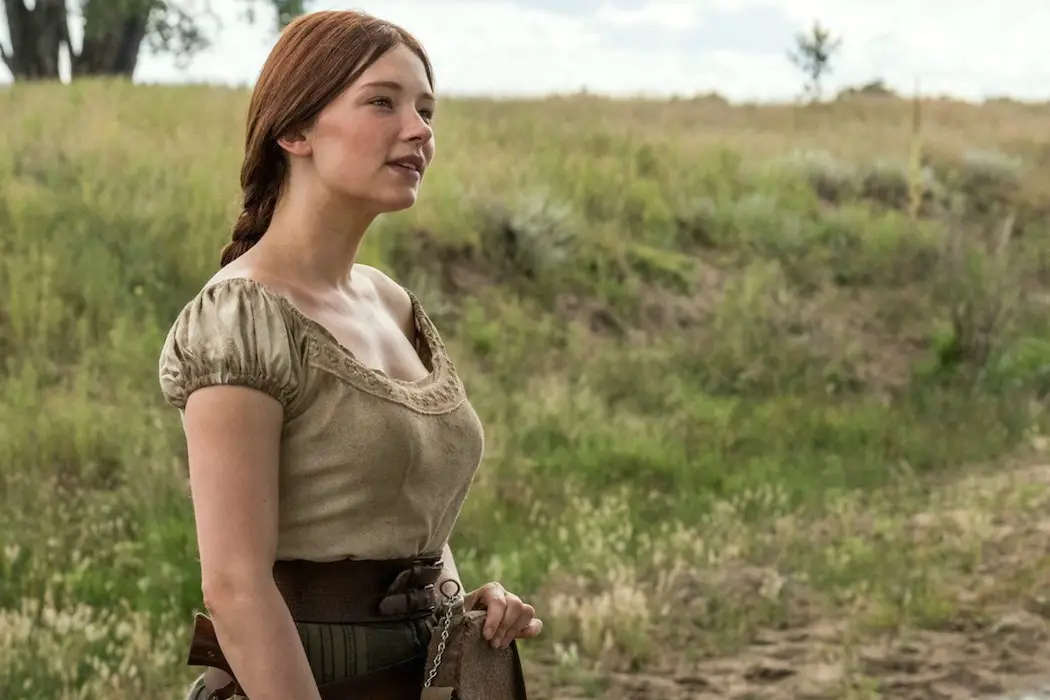
I love film, more than people probably, and I will…
Westerns are the one genre I’ve never really gotten along with. I’ll watch a good one, and I have watched a number of classics, but it’s a genre that’s never particularly resonated with me. My father is a big fan of them, as are some good friends of mine, so this summer I made the decision to just try hard to find something I liked (other than Rio Bravo). Within this mix of films, one I watched was the original The Magnificent Seven. I thought it was okay, kind of fun. But again, like most westerns, it didn’t greatly impress me.
A lot of my dissociation from the western genre I think comes from the fact that it is generally a male genre. Not that it’s a genre particularly made for or liked by men (both of which I find, personally, to be true) but because it is one centered around men. When women do appear they are frequently kidnapped or left at the homestead while the men fulfill their quests – yet, more often then not they’re prostitutes. Very rarely do they actually get in on the action, and they are almost never allowed to show anger toward their aggressor.
Because of this lack of female protagonists when I watch a western there is no one for me to attach myself to, to engage with, and experience the story through. It’s simple character identification; I feel more for films when a woman of a similar age and type to me is part of the action. So, it goes without saying, that when I’m watching a western I don’t feel represented, I don’t invest in the story, and I don’t particularly enjoy the film.
The Magnificent Eighth
This lack of interest in the western genre (and my recent watch of the original) didn’t actually put me off seeing the new remake, The Magnificent Seven. I liked a lot of the actors involved and I’m always prepared to give something a second chance. Surprisingly, I was thrilled with the remake. Many other critics weren’t, which surprised me, as I thought it was a huge improvement on the original film. Not only in its representation, but in its production. Or maybe I’ve just watched so many remakes now I have a very realistic idea of what to expect.
It’s a brilliant film, the cast is pretty great and pulls off some fine performances. The action is on point and Antoine Fuqua does a superb job in his direction. However, possibly the main reason for my loving this remake is the inclusion of the strong, heroic Emma Cullen. The film begins with the recognizable, chiseled-jawed Matt Bomer (as Emma’s husband, Matthew Cullen) standing up to Peter Sarsgaard’s Bogue. However, like a Janet Leigh in Psycho turn of events, Matthew is killed by Bogue and wife Emma (Haley Bennett) is left in his place.
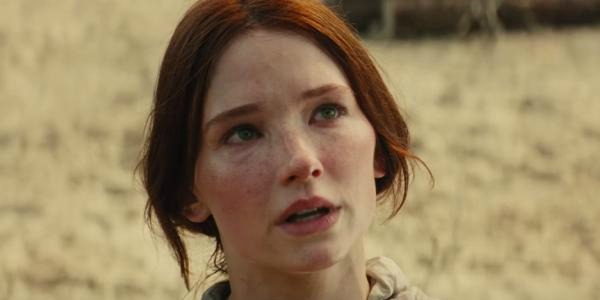
While this scenario, of a frontierswoman seeking someone to avenge her family is popular in the western, Emma Cullen’s story diverges a great deal. She isn’t just after revenge, she’s after righteousness – more than that she seems to be the only person in her town intent on protecting it. She is (as she says herself) the only one with balls enough. Then while the men of her town, and even some of the seven, fall apart, she retains the strength to confront and shoot down her enemy.
While she is moved aside for the final denouncement, and so she should be along with the other men in the village (they are the defended after all), it is Emma who gets to make the final shot. She is the one who gets to kill Bogue in his final confrontation with the film’s hero Chisholm (played by Denzel Washington). Emma Cullen not only instigates the action which eventually saves the town, she is the one who gets to finish off the villain, the man who killed her husband, in a tremendous show of justice.
Had I been writing a review of this film, you can bet that I would have spent at least 400 words discussing how brilliant Emma Cullen was and what a breath of fresh air she was to the male heavy genre and popular cinema in general. I would have applauded Fuqua along with the writers Nic Pizzolatto and Richard Wenk for creating such a strong, well-rounded female character who is treated with a certain amount of respect by her male peers.
I also would have gushed over Haley Bennett, who I had not seen since her teenage outing in Music & Lyrics. Other critics? Not only were they less enthused about the film as a whole, they seemed to miss Emma altogether.
What Everyone Else Saw
I was first made aware of Emma’s absence from any of the major reviews of The Magnificent Seven in the weeks after I first saw the film. I made accusations, sure, however in my research for this article it only seemed fair that I didn’t make any judgements about male critics in particular and that I didn’t assume that everyone had missed Emma Cullen. And so I went through what became fourteen of the most popular film magazines, journals and popular newspaper reviews in an effort to discover more. But what I discovered only strengthened my belief that when it came to Emma Cullen the majority of critics were blind.
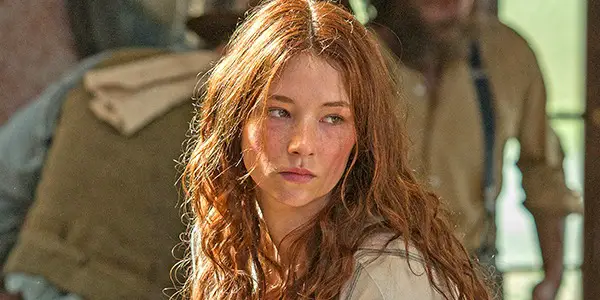
To begin, it seems like most of the critics were caught up with not this remake per se but how it compared to the original. Reviews of this remake run over with descriptions of the original film along with, lest we forget, the fact that the original The Magnificent Seven was a remake of Kurosawa’s famed Seven Samurai (did you know that? I knew that, didn’t stop pretty much every guy I know from telling me that though). On the whole, the reviews of this remake put me in mind of a ‘trivia-off’, a case of who knows more about film. Which is not what good criticism is about; some objectivity wouldn’t have gone amiss.
Being so caught up as they were in the original film, and how this remake differed, you would have thought that Emma Cullen (being the most obvious change in proceedings) would have stood front and centre in their reviews. But she didn’t. It was more important to draw attention to how brilliant the original film was in comparison to how mediocre this new one was than to cast an eye in Emma’s direction. Even when Emma was mentioned, it was brief, two sentences at most is all they gave her. And then even when they elaborate, their viewpoint could be described as dismissive, and even a little sexist.
And That Was All They Wrote
Across fourteen reviews, I found only eleven that mentioned Emma Cullen, which to me seemed very strange, as she is so central to the story. While most of the critics seemed to be able to mention Emma in passing (even as part of the general synopsis) Variety’s Owen Gleiberman, Total Film’s Jamie Graham, and Time Out’s Joshua Rothkopf negated to mention her at all. Which disappointed me greatly as I have a lot of respect for these publications, and a very high regard for Jamie Graham. However, I’m not going to judge them too harshly. We all see different things when we watch a film, but missing such an important character altogether I do believe is bad form in a critical review.
That being said the reviews that do mention Emma aren’t very kind. Kenneth Turan (of the Los Angeles Times) writes “Cullen, who at times dresses like she’s headed for a West L.A. yoga class, runs into Sam Chisolm” and later in the same piece”Cullen’s plea (or maybe it’s her outfits) touches something in Chisolm and he starts to round up the gang”. Yes, Emma is wearing some low-cut tops but the woman is clearly baking in the heat, and last time I checked we women shouldn’t have to wear polo necks to be taken seriously. To call attention to this, and to give her no mention better than a flighty piece of eye candy is unreasonable in my opinion.
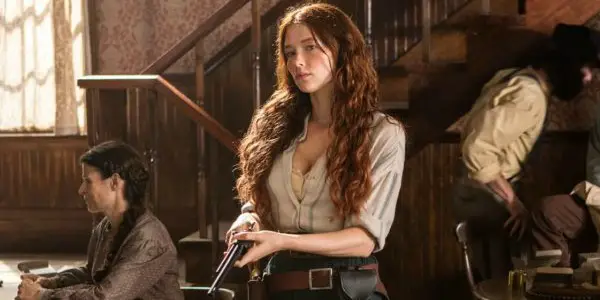
However, Turan was not the only critic to refer to Emma in this way. The Guardian’s Jordan Hoffman cites her only once as “Emma Cullen (Haley Bennett, forever in a low-cut shirt)”. Don’t get me wrong, if you have something important to say about the revealing nature of a female character’s dress then go ahead and say it, but to not further the criticism and to cite Emma only within these terms I feel not only shrugs off the importance of her role but actively demeans her character.
It doesn’t make things any better that the only female critic I found in the fourteen strong bunch also derided Emma’s importance. The Observer’s Wendy Ide writes: “And despite the feisty widow Emma Cullen (Haley Bennett) claiming to have a monopoly on balls in the besieged small-town community of Rose Creek, there’s a touch of casual sexism here. When Emma saves Chisholm by shooting an adversary, he walks over and takes her rifle, later handing it to the nearest man.”
I had to re-watch the film to find this moment. Chisholm does take the rifle from Emma, yes, in a way I imagined was a reassuring ‘it’s all over, no need to worry now’ kind of way. There’s a long scene before Chisholm actually throws the rifle to Emma’s injured friend Teddy, which I thought was a show of approval for the fact that Teddy did a good job. I’m not going to argue the point too much as we all perceive such things in different ways. However, I feel that here Ide is really dredging the film for the merest hint of sexism. Again, this is the only time Emma is mentioned in the whole review.
Saving Graces
All this being said, the importance of Emma Cullen wasn’t lost on all the critics. While she is never described to as high a degree as perhaps I would have written her, notice is taken of her importance to the narrative, and also her importance to the western genre as a whole. Manohla Dargis (The New York Times) writes “including a gun-toting frontierswoman, Emma (Haley Bennett). She’s sassy, but some messes a gal can’t clean up alone”, while Sight & Sound’s Nick Pinkerton says “and that the deciding shot of the film is fired by a woman (Haley Bennett‘s vengeance-driven widow), may render The Magnificent Seven of interest to those with an especial concern with issues of representation in popular movies”.
Even the Village Voice’s Alan Scherstuhl takes a moment to acknowledge Emma’s importance in the words “This time, it’s more of a seven-person band, and even that “seven” is pretty fluid, with Haley Bennett (as the widow who talks Chisolm into saving her town) at least a charter member”. Like the rest of the critics included in this piece the acknowledgement is scant but at least recognizes Emma’s importance to the plot and, importantly, her addition in relation to the original narrative.
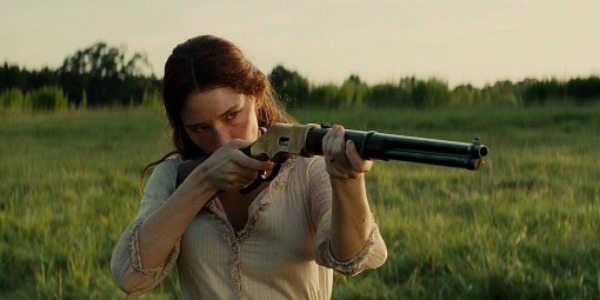
However, and I note this proudly, the greatest acknowledgement of Emma’s role I found in the review of our very own Managing Editor, David Fontana, who wrote “Rather than surrender to Bogue’s wishes, though, town inhabitant Emma Cullen (Haley Bennett) decides to put up a defense, coming in the form of hiring an army…. In addition to this diversity within the Seven, there is an enhanced gender role in the form of Emma Cullen, played by Bennett, who is the first to hire Chisolm and also refuses to be held down by the traditional women role for the time.”
Conclusion
Hopefully, if you haven’t just scanned this article, you’ll have considered that my argument is good enough to be valid. If, though, you haven’t, you may want to accuse me of crying ‘sexism’ where it doesn’t exist. Which, believe me, is not what I’m doing. I’m not accusing my male colleagues of sexism (except in a few cases), but I am accusing them of a bunch of other things.
I say that their hang-up on the original film got in the way of some proper film criticism, that (perhaps because they are men and experiencing the film through the male protagonists) they missed Emma in their lack of objectivity. That, on the face of it, isn’t necessarily sexism, it’s just bad film criticism.
Interestingly, I didn’t set off in my research to find out how many female film critics there were, or how many had reviewed this film but here you have it. One in fourteen. It’s not what I expected to be honest, and something I hope is remedied in the coming years. You may doubt what I say here, the publications I’ve chosen, the critics I’ve cited, the importance I’ve placed on Emma, but if you do indeed doubt me then do watch the film (again, perhaps?) and look up my sources for yourself. In the section below this you’ll find a list of the critics, with links to the original reviews. More than that you’ll find where I have copied over the only text in which they mention Emma. If you doubt the citations you can go through the original articles and check for yourself. I’m a big believer in disclosure.
Finally I’d like to say that while the issue I bring forth here is about sex, I don’t believe it’s necessarily an issue of sexism. I think this is about trying harder to create good, fair-minded, objective, film criticism. Criticism that is unclouded by the sex of the writer. I do believe that subjectivity can get in the way of good film critic and I believe we and our colleagues at other publications should review fairly and construct good arguments – anything less and what do we become? We beg and plead for more empowered female characters on our screens and what happens when one drops in her lap? We dismiss her? Emma Cullen didn’t seek revenge, she sought righteousness, and so do I.
What did you think of Emma Cullen? How was she critiqued in the reviews you read? Add your comments and links below.
Sources
(Quotes specifically about Emma have been stated here verbatim, in the cases where she was mentioned more than once the quotes have been compressed, but separated by ellipses. Follow the links to see the articles in full.)
Bradshaw, Peter. The Magnificent Seven Review – Denzel off his game in heavy-handed remake. The Guardian.
“Angry widow Emma Cullen (Haley Bennett) hires Sam Chisholm (Denzel Washington).”
Dargis, Manohla. Review: Denzel Washington Rides High in ‘Magnificent Seven‘. The New York Times.
“The story — the script is credited to Nic Pizzolatto and Richard Wenk — pretty much follows the line of the 1960 film, with some tweaks that speak to contemporary mores, including a gun-toting frontierswoman, Emma (Haley Bennett). She’s sassy, but some messes a gal can’t clean up alone, so she hires the gunslingers, beginning with Mr. Washington’s bounty hunter, Chisolm. She wants to rid her town of its own mustache-twirler, Bartholomew Bogue (Peter Sarsgaard)…. Emma makes her pitch to Chisolm while he stares down at her from horseback. He casually asks if she’s after revenge. “I seek righteousness,” she replies, “but I’ll take revenge,” an exchange that affirms the story’s bloody course.”
De Semlyen, Phil. The Magnificent Seven Review. Empire.
(mention in synopsis ahead of review) “the townspeople send newly widowed Emma Cullen (Bennett) to find a band of men crazy enough to tackle him.”
Fontana, David. The Magnificent Seven: A Generic Remake Despite A Diverse & Talented Cast. Film Inquiry.
“Rather than surrender to Bogue’s wishes, though, town inhabitant Emma Cullen (Haley Bennett) decides to put up a defense, coming in the form of hiring an army…. In addition to this diversity within the Seven, there is an enhanced gender role in the form of Emma Cullen, played by Bennett, who is the first to hire Chisolm and also refuses to be held down by the traditional women role for the time.”
Gleiberman, Owen. Film Review: ‘The Magnificent Seven‘. Variety.
No mention.
Graham, Jamie. The Magnificent Seven Review: “Not Quite Magnificent But A Rare Remake That Actually Delivers” Total Film.
No mention.
Hoffman, Jordan. The Magnificent Seven review: moderate remake opens 41st Toronto film festival. The Guardian (First look review).
“a bounty hunter who agrees to pleas from desperate Emma Cullen (Haley Bennett, forever in a low-cut shirt) to rescue her humble hamlet”.
Ide, Wendy. The Magnificent Seven Review – the re-shoot. The Observer.
“And despite the feisty widow Emma Cullen (Haley Bennett) claiming to have a monopoly on balls in the besieged small-town community of Rose Creek, there’s a touch of casual sexism here. When Emma saves Chisholm by shooting an adversary, he walks over and takes her rifle, later handing it to the nearest man.”
McCarthy, Todd. ‘The Magnificent Seven‘ Film Review: TIFF 2016. The Hollywood Reporter.
“Sam begins gathering societal misfits around him who might, for fun and possible profit, be willing to take on the bad boys on behalf of the helpless, most prominently represented by recently widowed redhead Emma (Haley Bennett).”
Pinkerton, Nick. The Magnificent Seven. Sight & Sound. (Sight & Sound don’t put their reviews online, this review appeared in their November 2016 issue.)
“as well as the fact that Fuqua and his leading men are black, that Washington’s character’s backstory includes a lynching episode, and that the deciding shot of the film is fired by a woman (Haley Bennett‘s vengeance-driven widow), may render The Magnificent Seven of interest to those with an especial concern with issues of representation in popular movies.”
Rothkopf, Joshua. The Magnificent Seven. Time Out.
No mention.
Scherstuhl, Alan. Not ‘Magnificent‘, But Not Bad. The Village Voice.
“This time, it’s more of a seven-person band, and even that “seven” is pretty fluid, with Haley Bennett (as the widow who talks Chisolm into saving her town) at least a charter member…. The first half is a series of tense introductions and showdowns, as Chisolm gathers his men (and the widow tags along.)”
Turan, Kenneth. Review: The Denzel Washington-led Remake of ‘The Magnificent Seven‘ is handsome, but lifeless. Los Angeles Times.
“With the men in town not knowing what to do, newly widowed Emma Cullen (Haley Bennett) takes it on herself to find a solution. In nearby Amador City, Cullen, who at times dresses like she’s headed for a West L.A. yoga class, runs into Sam Chisolm, an efficient killing machine with a bit of a conscience….. “I seek righteousness, as should we all,” Cullen explains to him in one of the film’s few serious moments. “I’ll take revenge.” Cullen’s plea (or maybe it’s her outfits) touches something in Chisolm and he starts to round up the gang.”
Viner, Brian. The Magnificent Seven is more of a misfiring mistake which should not be compared with the original. The Daily Mail.
“When his villainy makes a widow of young, pretty Emma Cullen (Haley Bennett), she sets off to find a posse of saviors. She starts with Sam Chisholm (Denzel Washington) and he recruits the rest.”
Does content like this matter to you?
Become a Member and support film journalism. Unlock access to all of Film Inquiry`s great articles. Join a community of like-minded readers who are passionate about cinema - get access to our private members Network, give back to independent filmmakers, and more.
I love film, more than people probably, and I will watch pretty much anything. Seriously, anything! I have a postgraduate education in film & have spent an exceptionally long time trying to get inside the film industry. I'm a big believer in treating every film the same, and bringing something new to the film theory table, giving reasons for every argument made. You'll find that I'm an empathetic and fun sort of reviewer, at least, I like to think so. If I'm not watching films I'm doing exceptionally nerdy stuff, like watching documentaries about the history of medicine and collecting photos of old post boxes.












